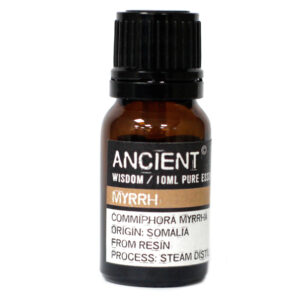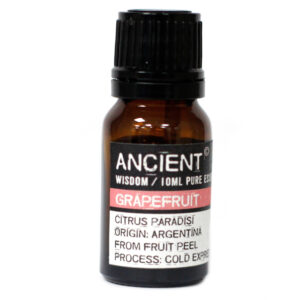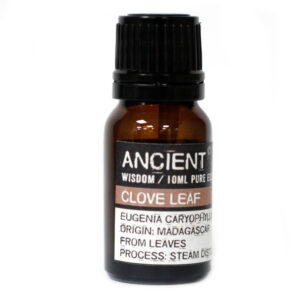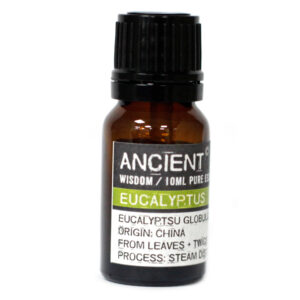
Description
The World of Aromatherapy’s Ginger Essential Oil
🌱 From the heart of nature’s underground treasures, The World of Aromatherapy unveils its Ginger Essential Oil, a warming symphony of zest and spice.
🔥 Distilled from the robust rhizomes of the ginger plant, this oil releases an invigorating aroma, embodying the rich, spicy essence that ginger is celebrated for.
💆♂️ Beyond its aromatic allure, Ginger Oil is a beacon of revitalisation, often sought after for its energising properties and its ability to soothe and rejuvenate the senses.
🌍 Elegantly bottled with a commitment to sustainability, we guarantee a purity that captures the earthy soul of its source with every drop.
🌟 Delve into a sensory journey of warmth and vitality with our Ginger Essential Oil, and let its vibrant embrace ignite a renewed passion within.
Latin Name: Zingiber Officinale
Part Of Plant Used: Root
Source: India
Extraction Method: Steam Distillation
Ginger Essential Oil is extracted from the Zingiberaceae officinale plant, also known as Common or Jamaica Ginger. The name ginger is derived from the place called Gingi in the state of Tamil Nadu, India, and the Tamil word for ginger, inji-ver. The oil is extracted by steam distillation from the unpeeled or dried, ground-up root of the plant. It is a warming oil and is particularly good for digestion and fighting nausea and vomiting.
Ginger oil has many therapeutic properties. It is used in the treatment of fractures, soothing the pain of rheumatism, arthritis, and carbuncles. It helps with hangovers, motion sickness, colds, flu, coughs, sinusitis, sore throat, skin sores, diarrhoea, colic, cramps, chills and fever. Used in a vaporiser, this oil fights loneliness and depression, and its energizing properties make it a good aphrodisiac. Put a drop of oil on a handkerchief and inhale to control nausea, motion sickness, and colds.
Ginger has its origins in India, China, and Java, but is also native to Africa and West Indies. Sanskrit and Chinese texts mention the use of ginger as medicine. It is also mentioned in ancient Greek, Roman, and Arabian literature. Dried ginger is used for stomach aches, diarrhoea, throat problems, and nausea. The Chinese also use it to boost the heart and to reduce mucus and phlegm.
Additional information
| Weight | 0.04 kg |
|---|---|
| Size | 10ml, 50ml, 500ml |
You must be logged in to post a review.
Related Products
Related products
-

Myrrh Essential Oil
£22.95 – £675.00Price range: £22.95 through £675.00 Select options This product has multiple variants. The options may be chosen on the product page -

Grapefruit Essential Oil
£4.55 – £89.00Price range: £4.55 through £89.00 Select options This product has multiple variants. The options may be chosen on the product page -

Clove Leaf Essential Oil
£3.55 – £69.99Price range: £3.55 through £69.99 Select options This product has multiple variants. The options may be chosen on the product page -

Eucalyptus Essential Oil
£4.25 – £59.95Price range: £4.25 through £59.95 Select options This product has multiple variants. The options may be chosen on the product page
Ginger Essential Oil: Exploring the Benefits and Uses in Aromatherapy
Ginger essential oil is a versatile and popular oil used in the world of aromatherapy. It is derived from the root of the ginger plant, which has been used for centuries in traditional medicine to treat a variety of ailments. Ginger essential oil has a warm, spicy, and invigorating scent that is both uplifting and calming.
Understanding the properties and benefits of ginger essential oil is essential for anyone interested in aromatherapy. Ginger essential oil contains a number of active compounds, including gingerol and shogaol, which have anti-inflammatory, analgesic, and antioxidant properties. These compounds make ginger essential oil an effective natural remedy for a range of health issues, from digestive problems and nausea to respiratory conditions and skin disorders.
Key Takeaways
- Ginger essential oil is derived from the root of the ginger plant and has been used for centuries in traditional medicine.
- Ginger essential oil contains active compounds that have anti-inflammatory, analgesic, and antioxidant properties.
- Ginger essential oil can be used to treat a range of health issues, from digestive problems and nausea to respiratory conditions and skin disorders.
Understanding Ginger Essential Oil
Ginger essential oil is extracted from the underground rhizome of the perennial plant Zingiber officinale, which belongs to the Zingiberaceae family. It is commonly used in aromatherapy due to its numerous therapeutic properties.
The main compounds in ginger essential oil are gingerol and zingiberene, which are responsible for its characteristic aroma and therapeutic benefits. Gingerol is known for its anti-inflammatory and antioxidant properties, while zingiberene has been found to have antimicrobial and analgesic effects.
When used in aromatherapy, ginger essential oil is believed to have a warming and stimulating effect on the body and mind. It is commonly used to alleviate feelings of nausea, improve digestion, and boost the immune system.
Here are some of the benefits of ginger essential oil:
- Alleviates nausea: Ginger essential oil has been found to be effective in reducing nausea and vomiting caused by motion sickness, morning sickness during pregnancy, and chemotherapy-induced nausea.
- Improves digestion: Ginger essential oil stimulates the digestive system, promoting the production of digestive juices and enzymes. It can also help alleviate digestive issues such as bloating, constipation, and indigestion.
- Boosts the immune system: Ginger essential oil has antimicrobial properties that can help protect the body against infections and illnesses. It also stimulates the production of white blood cells responsible for fighting off infections.
It is important to note that ginger essential oil should be used with caution, as it can cause skin irritation and should not be ingested without the guidance of a healthcare professional.
Extraction and Components of Ginger Essential Oil
Ginger essential oil is extracted from the rhizome of the ginger plant using various extraction methods. The conventional methods of extraction include steam distillation, hydro-distillation, solvent extraction/liquid-liquid, and Soxhlet. Advanced methods of extraction include Supercritical CO2, Subcritical water, Solvent-free, Microwave-assisted, and Microwave hydro-diffusion and gravity.
The most commonly used method of extraction for ginger essential oil is steam distillation. Steam is passed through the ginger rhizome during this process, which releases the essential oil. The steam and essential oil are then condensed, and the oil is separated from the water.
The chemical composition of ginger essential oil can vary depending on the extraction method used. The major components of ginger essential oil include zingiberene, camphene, and gingerol. Zingiberene is a sesquiterpene hydrocarbon that gives ginger essential oil its characteristic aroma. Camphene is a monoterpene that contributes to the oil’s fresh, woody scent. Gingerol is a phenolic compound that is responsible for the oil’s therapeutic properties.
The table below shows the percentage composition of the major components of ginger essential oil obtained using steam distillation:
| Component | Percentage Composition |
|---|---|
| Zingiberene | 30-40% |
| Camphene | 10-15% |
| Gingerol | 5-10% |
In addition to these major components, ginger essential oil contains other minor components such as ar-curcumene, β-bisabolene, and β-sesquiphellandrene.
It is important to note that the quality of ginger essential oil can vary depending on the source and extraction method used. Therefore, choosing a reputable supplier that uses high-quality ginger rhizomes and employs proper extraction techniques to obtain a pure and potent essential oil is essential.
Aromatherapy and Ginger Essential Oil
Ginger essential oil is a popular choice in aromatherapy due to its many potential benefits. Aromatherapy is the use of essential oils to promote physical and emotional well-being. Essential oils are highly concentrated plant extracts that are used for their fragrance and therapeutic properties.
Ginger essential oil is extracted from the root of the ginger plant through steam distillation. It has a warm, spicy, and invigorating aroma that can help promote comfort and relaxation. Ginger essential oil can help create a calming and soothing atmosphere when used in a diffuser.
In aromatherapy, ginger essential oil is often used for its potential digestive benefits. It can help relieve nausea, bloating, and indigestion. Additionally, ginger essential oil can help relieve muscle and joint pain, making it a popular choice for massage oils.
When using ginger essential oil in aromatherapy, it is important to dilute it properly. Never apply undiluted essential oils directly to the skin as they can cause irritation or allergic reactions. Instead, mix a few drops of ginger essential oil with a carrier oil such as coconut or jojoba oil before applying it to the skin.
Overall, ginger essential oil is a versatile and beneficial addition to any aromatherapy routine. Its invigorating aroma and potential therapeutic properties make it popular for promoting relaxation and comfort.
Ginger Essential Oil in Massage Therapy
Ginger essential oil is a popular choice for massage therapy due to its warming and soothing properties. When used in massage, ginger oil can help to ease muscle pain, reduce inflammation, and promote relaxation.
Massage therapists often blend ginger oil with carrier oils such as jojoba or coconut oil to create a massage oil that can be applied to the skin. It is important to dilute ginger oil before applying it to the skin, as it can be quite strong and may cause skin irritation if used undiluted.
To create a ginger massage oil, mix a few drops of ginger oil with a carrier oil of your choice. The exact dilution ratio will depend on the strength of the ginger oil and the sensitivity of the client’s skin. As a general rule, a dilution of 1-2% is recommended for most massage applications.
When using ginger oil in massage, it is important to note that it has a warming effect on the skin. This can be beneficial for easing muscle pain and tension, but it may not be suitable for everyone. Clients sensitive to heat or with certain medical conditions should consult with their healthcare provider before receiving a ginger oil massage.
Overall, ginger essential oil can be a valuable tool for massage therapists looking to provide their clients with a relaxing and therapeutic experience. By blending ginger oil with a carrier oil and using it in massage, therapists can help ease muscle pain, reduce inflammation, and promote relaxation in their clients.
Health Benefits of Ginger Essential Oil
Ginger essential oil is extracted from the root of the ginger plant, Zingiber officinale. It has been used for centuries in traditional medicine for its numerous health benefits. Ginger oil is rich in antioxidants, anti-inflammatory, and analgesic compounds, making it a popular natural remedy for various ailments.
Pain and Inflammation Relief
Ginger essential oil is known for its pain-relieving properties. It contains gingerols and shogaols, which are potent anti-inflammatory compounds that help reduce pain and inflammation. Ginger oil can be used topically to alleviate muscle and joint pain associated with arthritis, rheumatism, and other inflammatory conditions.
Digestive Health Support
Ginger essential oil is a natural remedy for digestive issues like indigestion, bloating, and nausea. It helps stimulate digestion by increasing the production of digestive enzymes. Ginger oil also has anti-spasmodic properties that help relieve stomach cramps and discomfort.
Respiratory Health Support
Ginger essential oil has expectorant properties that help loosen mucus and phlegm in the respiratory tract. It is useful in treating respiratory issues like coughs, colds, and sore throats. Ginger oil also has antiviral properties that help boost the immune system and fight off infections.
Mental Health Support
Ginger essential oil is known for its calming and soothing effects on the mind and body. It has been used for centuries to alleviate symptoms of anxiety, depression, and fatigue. Ginger oil can be used in aromatherapy to promote relaxation and reduce stress levels.
In summary, ginger essential oil has numerous health benefits, making it a popular natural remedy for various ailments. Its anti-inflammatory, antioxidant, and analgesic properties make it an effective natural remedy for pain, inflammation, and digestive issues. Ginger oil also has expectorant properties that help support respiratory health and have calming effects on the mind and body.
Ginger Essential Oil for Skin and Hair
Ginger essential oil is a popular choice in the world of aromatherapy due to its many benefits. It is extracted from the root of the ginger plant and has a warm, spicy, and invigorating scent. Ginger essential oil is known for its anti-inflammatory and antioxidant properties, making it a great addition to any skincare routine.
Skin Benefits of Ginger Essential Oil
Ginger essential oil is believed to have several benefits for the skin. Some of these benefits include:
- Reducing inflammation: Ginger essential oil has anti-inflammatory properties that can help reduce redness, swelling, and irritation on the skin.
- Fighting signs of aging: Ginger essential oil contains antioxidants that can help protect the skin from free radical damage, which can lead to premature aging.
- Improving skin tone: Ginger essential oil can help improve skin tone by increasing circulation and promoting the production of collagen.
- Treating acne: Ginger essential oil has antibacterial properties that can help fight acne-causing bacteria and reduce the appearance of acne.
To use ginger essential oil on the skin, it is important to dilute it with a carrier oil, such as coconut oil or jojoba oil. This can help prevent skin irritation and ensure that the oil is absorbed properly.
Hair Benefits of Ginger Essential Oil
Ginger essential oil is also believed to have several benefits for the hair. Some of these benefits include:
- Promoting hair growth: Ginger essential oil can help stimulate blood flow to the scalp, which can promote hair growth.
- Reducing hair loss: Ginger essential oil has anti-inflammatory properties that can help reduce inflammation on the scalp, which can contribute to hair loss.
- Soothing an itchy scalp: Ginger essential oil can help soothe an itchy scalp and reduce dandruff.
To use ginger essential oil on the hair, it is important to dilute it with a carrier oil, such as olive oil or almond oil. This can help prevent skin irritation and ensure that the oil is absorbed properly.
Overall, ginger essential oil is versatile and can provide many benefits for both the skin and hair. However, using it properly and diluting it with a carrier oil is important to avoid any potential irritation.
Safety and Precautions with Ginger Essential Oil
Ginger essential oil is generally considered safe for most people when used appropriately. However, it is important to take some precautions to ensure that you use the oil safely and avoid any potential side effects.
Safety
Ginger essential oil is generally safe for most people when used in moderation. However, it is important to note that some people may experience skin irritation or allergic reactions when using the oil. To avoid any adverse reactions, performing a patch test before using the oil topically is recommended.
Children
Ginger essential oil should be used with caution around children. Using the oil undiluted on children under the age of 3 is not recommended. When using the oil on children, it is important to dilute it properly and use it in small amounts.
Irritation
Ginger essential oil may cause skin irritation in some people. To avoid any irritation, it is recommended to dilute the oil before using it topically. It is also important to avoid using the oil on broken or damaged skin.
Pregnancy
Ginger essential oil should be used with caution during pregnancy. It is recommended to consult with a healthcare professional before using the oil during pregnancy. It is also important to avoid using the oil in the first trimester of pregnancy.
Other Precautions
Here are some additional precautions to keep in mind when using ginger essential oil:
- Do not ingest the oil unless under the supervision of a healthcare professional.
- Do not use the oil near the eyes or mucous membranes.
- Do not use the oil in large amounts or for prolonged periods of time.
- Keep the oil out of reach of children and pets.
- Store the oil in a cool, dry place away from direct sunlight.
In summary, ginger essential oil is generally safe for most people when used appropriately. However, it is important to take some precautions to ensure that you use the oil safely and avoid any potential side effects. If you have any concerns about using ginger essential oil, it is recommended to consult with a healthcare professional.
Ginger Essential Oil in Various Cultures
Ginger has been used as a spice and medicinal plant in various cultures for centuries. The essential oil derived from ginger root or rhizome has been used for its therapeutic properties and spicy aroma. Here is a look at how ginger essential oil has been used in different cultures.
Asia
Ginger is native to Asia, and the use of ginger in traditional medicine dates back to ancient times. In Ayurveda, ginger is considered a warming herb that promotes digestion and circulation. Ginger essential oil is used in aromatherapy to promote energy, focus, and vigour.
India
In Indian culture, ginger is used as a spice in many cuisines and is also used in traditional medicine. Ginger essential oil is used to treat digestive issues, such as bloating, nausea, and indigestion. It is also used to relieve pain and inflammation.
West Indies
Ginger is a popular spice in West Indian cuisine and is also used in traditional medicine. Ginger essential oil is used to treat respiratory issues, such as coughs, colds, and digestive issues.
China
Ginger has been used in Chinese medicine for over 2,000 years. Ginger essential oil is used to treat digestive issues, such as nausea, vomiting, and diarrhoea. It is also used to relieve pain and inflammation.
Rome
Ginger was introduced to Rome from India and was used as a spice and medicine. Ginger essential oil was used to treat digestive issues like indigestion and flatulence.
In conclusion, ginger essential oil has been used in various cultures for its therapeutic properties and spicy aroma. It has been used to treat digestive, respiratory, pain, and inflammation issues.
Blending Ginger Essential Oil
Ginger essential oil is a versatile and popular oil that is often used for its warming and soothing properties. It blends well with a variety of other essential oils, making it a great choice for creating custom blends. Here are some tips for blending ginger essential oil with other oils:
Blending with Citrus Oils
Ginger essential oil can be paired with citrus oils to create a bright and uplifting blend. Try blending ginger with lemon, lime, or orange essential oils. These oils are also known for their uplifting and energizing properties, making them a great choice for a morning pick-me-up.
Blending with Spicy Oils
Ginger essential oil has a spicy and warming aroma, making it a great choice for blending with other spicy oils. Try blending ginger with black pepper or cardamom essential oils for a warming and invigorating blend.
Blending with Herbal Oils
Ginger essential oil can also be paired with herbal oils like rosemary. This combination creates a grounding and earthy blend that is perfect for promoting relaxation and reducing stress.
Blending with Grapefruit Oil
Ginger essential oil can be paired with grapefruit essential oil to create a bright and refreshing blend. This blend is perfect for reducing mental fatigue and boosting energy levels.
When blending ginger essential oil, it’s important to start with a small amount and add more as needed. A good rule of thumb is to use 2-3 drops of ginger essential oil for every 10ml of carrier oil. This will ensure that the blend is properly diluted and safe for use.
Overall, ginger essential oil is a versatile oil that can be blended with a variety of other oils to create custom blends that suit your needs. Whether you’re looking for a warming and invigorating blend or a grounding and relaxing blend, ginger essential oil is a great choice.
Conclusion
In conclusion, Ginger Essential Oil has a long history of use in traditional medicine for its various therapeutic properties. The oil is extracted from the root of the ginger plant and contains several active compounds that contribute to its pharmacological activities.
Research has demonstrated that ginger oil possesses anti-inflammatory, analgesic, antiemetic, and gastroprotective properties. These properties make it a valuable addition to aromatherapy, massage, and other therapeutic practices.
When using ginger oil, it is important to dilute it properly and use it in moderation to avoid any adverse effects. It is also important to note that ginger oil should not be used by pregnant women, individuals with sensitive skin, or those taking certain medications.
Overall, Ginger Essential Oil is a versatile and effective natural remedy that can be used to alleviate a variety of health conditions. Its pleasant aroma and numerous therapeutic benefits make it a valuable addition to any aromatherapy toolkit.

















Reviews
There are no reviews yet.